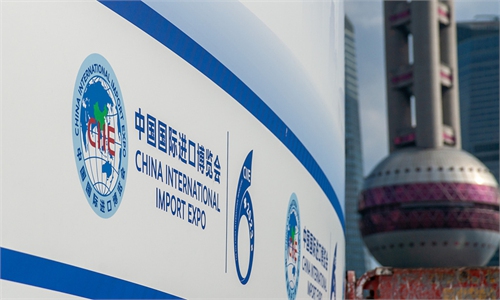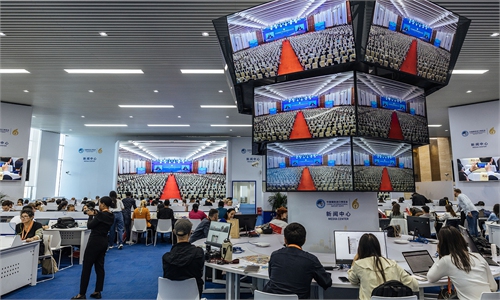
Illustration: Xia Qing/GT
The US is leading a "largest ever delegation" to the sixth China International Import Export (CIIE) in Shanghai. This includes up to 20 state governors, as well as US industry representatives, to "explore trade opportunities." The delegation comes despite uncertainties in the relationships between the two powers and the intent of some politicians to push so-called "decoupling" or "de-risking" with the goal of placing barriers between the world's two largest economies. This shows the opportunity of China is simply too big and globally significant to ignore for any serious global businessperson.In the eyes of the Washington DC bubble, business in China has been viewed in a zero-sum paradigm as a "net loss" for the US, creating the misleading narrative that trade with China somehow comes at the expense of its national interests and geopolitical dominance. With this narrative, the US has actively imposed various measures to try and encourage the shift of international supply chains, depicted other countries as alternatives, such as India and Vietnam, and placed ever higher export control barriers on China. Although in the year 2023 American foreign policy toward China has become less belligerent and antagonistic, the fundamental foreign policy mindset that integration between the two countries is "bad" is yet to be adequately challenged.
However, the reality on the ground is quite different. First, for American enterprises, the Chinese market is not replaceable and despite a concerted narrative of negativity pushed by the mainstream media, opportunities far outweigh the risks. China after all remains the single largest and most lucrative consumer market in the world by the measure of its population and level of development. China has firmly established itself as a nexus of global enterprise through its industrial, logistical and commercial capacity which exceeds every other country.
The opportunities China offers to the US are not just about tangible goods, but also about products and services too. Take for example, for McDonalds and KFC as worldwide American brand icons, with over 5,000 and 9,000 restaurants in China respectively, there is more money to be made in China than in the US. The idea that American businesses should not invest or operate in China is to effectively exclude them from one of the largest revenue sources in the world. However, this approach does not truly defend American interests; rather, it is akin to cutting off one's own nose to spite their face. It is widely recognized that if you are not present in China, you are essentially not participating in the game.
On the ground, American businesses, executives and grass-roots level politicians understand this. That's because they have to prioritize the real interests of American people and not the aloof, theatrical and elitist mindset of Washington DC which is out of synchronization with the world and is trapped in a bubble of its own self-aggrandizing rhetoric. If American farmers cannot sell to China, then where else can their products go? It comes as no surprise that businessmen have been the biggest opponents to antagonistic policies on China. Many American CEOs opposed the Trump-era tariffs, which have contributed to rising inflation, while industries have dramatically battled against proposed investment curbs. Even the targeted measures in the technology sector, such as those aimed at Nvidia, stand to surmount losses in the billions. Why? Because business with China matters.
Moving forward, relations between the two countries can improve if Americans are better informed that a comprehensive economic relationship with China is not "losing," but it is a win for American enterprises, American jobs and America's reputation as a global leader in business and commerce. For both countries to exist in a state of antagonism, tension and economic warfare is not just a loss for both sides, but for the whole world. This is why more efforts must be invested in improving the bilateral relationship and steering away from geopolitical conflict. The Shanghai CIIE serves as a symbol to show that the "China Dream" for American businesses is still alive. No matter how much negativity the media narrative may push, China's size, the opportunities it offers and the success in which it reaps will continue to speak louder, which is why Washington DC circles will never convince businessmen to give it up.
The author is a political and international relations analyst. opinion@globaltimes.com.cn



